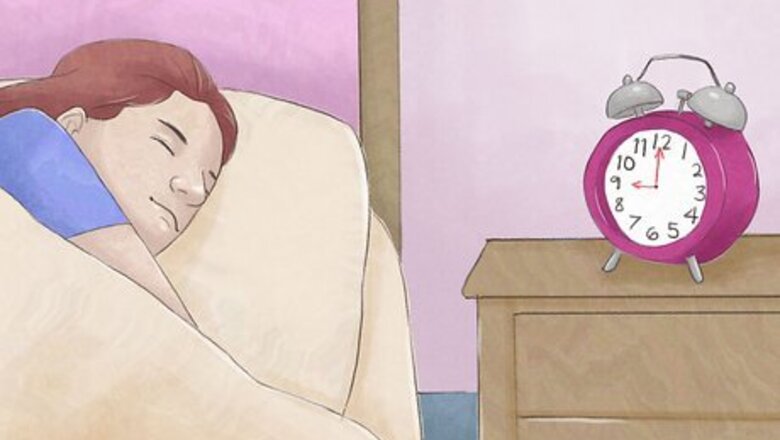
views
Resolving Common Physical Symptoms

Adopt a regular bedtime and routine to make it easier to fall asleep. People with lovesickness frequently complain of not being able to sleep. To make it easier to fall asleep and stay asleep at night, try these strategies: Go to bed and wake up at the same time every day, even on the weekend. Turn off screens, such as your TV, computer, and phone, at least 30 minutes before bedtime. Avoid drinking caffeinated beverages in the afternoon and evening. Make your bedroom cool, dark, and quiet and only use your bed for sleep and sex. Don’t work, eat, or pay bills in your bed.

Eat foods you enjoy in smaller, more frequent portions if you’ve lost your appetite. Loss of appetite and sometimes even weight loss are common complaints of lovesickness. To combat a loss of appetite, stick with foods that you enjoy and try to eat smaller, more frequent meals throughout the day. This will help to ensure that you always have some food in your system to keep you energized. Make sure to tell your doctor if you experiencing a loss of appetite along with unintended weight loss. This may be due to a wide range of medical conditions, so they may want to run tests to rule out other potential causes.

Drink a cup of ginger tea if you’re feeling nauseous. Some people experience nausea and vomiting when they are lovesick. Ginger is a powerful, natural antiemetic, which means that it can help to alleviate nausea and prevent vomiting. Try making yourself a cup of ginger tea. You can purchase ginger tea in a grocery store or use a piece of fresh ginger. To make ginger tea from fresh ginger, cut a 1 in (2.5 cm) piece of ginger and mince or crush it. Place the ginger into a mug and pour 8 fl oz (240 mL) of water over it. Then, steep the tea for 10 minutes. Sip the tea slowly after it finishes steeping. If you don’t have time to make ginger tea, you can chew on a piece of fresh, peeled ginger instead.
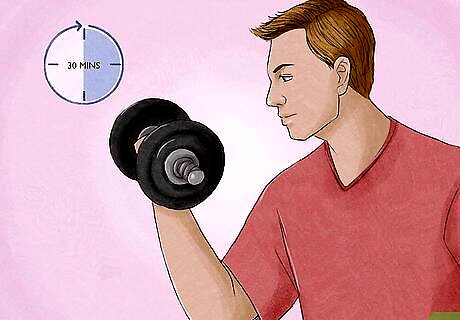
Exercise for 30 minutes on most days to release pent up energy. Getting regular cardiovascular exercise is an excellent way to relieve stress and pent up energy. It’s common to feel restless and overenergetic when you’re experiencing lovesickness, so getting regular exercise can be a helpful strategy. Do something that you enjoy to increase the chances that you’ll stick with it. Try going for a walk around your neighborhood, riding your bike along a scenic path, taking an aerobics class, or going for a swim at your local community pool. If you don’t have time to fit in 30 minutes of exercise at once, break it up into multiple chunks throughout the day, such as three 10-minute workouts or two 15-minute workouts.
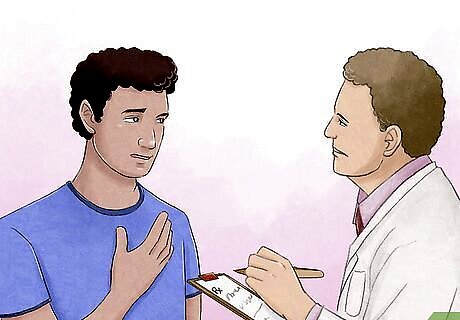
See a doctor if you’re experiencing chest pressure. Some people complain of strange sensations in their chest while experiencing lovesickness. This might be due to panic or it could be related to an underlying medical condition, so it’s important to have it checked by a doctor. Warning: Seek emergency medical care if you are experiencing pressure, tightness, squeezing, or pain in your chest or arms that spreads to your neck, back, or jaw. These may be symptoms of a heart attack.
Coping with Emotional Symptoms
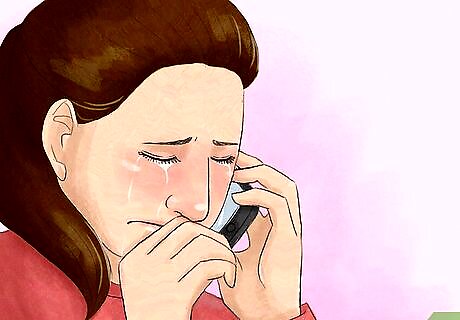
Talk with a trusted friend or family member about how you’re feeling. Talking with someone you trust can help you to feel more connected with others and this may ease some of the strong emotions associated with lovesickness. Call or meet up with a friend or family member and tell them about how you’ve been feeling and why. For example, you might call up a friend or family member and say something like, “Hey, I’m having a hard time coping since Regina turned me down for a date and I just need to talk to someone about it. Do you have time to meet up later?”
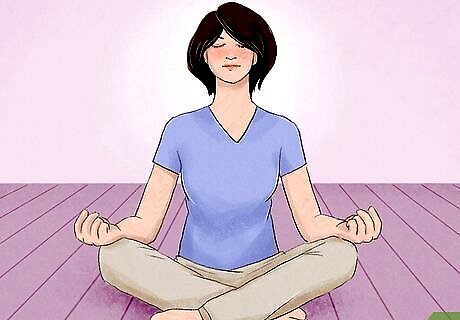
Relax for 15 minutes or more every day to ease anxiety. Stress and anxiety may be symptoms of lovesickness, and it’s important to find ways to manage stress and anxiety. Relaxation techniques are an effective way to experience a sense of calm. Some techniques you might try include: Yoga Meditation Progressive muscle relaxation Deep breathing

Avoid dulling your feelings with alcohol or drugs. Alcohol and drug can have an adverse effect on your mood, so it’s best to avoid these substances if you’re already struggling with mood swings or negative emotions, such as depression and anxiety. Talk with your doctor if you’re having trouble coping without alcohol or drugs. They can provide you with resources that may help you to quit.
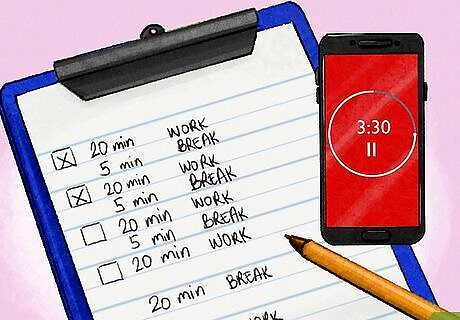
Try the Pomodoro technique if you’re having trouble concentrating. Difficulty concentrating is a common complaint when someone has lovesickness. The Pomodoro technique is a time management method where you work in 25-minute chunks or “poms.” After you complete a pom, you take a 5-minute break, and after you complete 4 poms, you take a longer break, such as 20 minutes. By working in this way, you may find it easier to maintain your focus and get more done. Use a kitchen timer or a timer on your phone to keep track of your poms. Mark an X on a piece of paper after you finish a pom and keep a running tally, so you will know how many you have done.

Write about your feelings in a journal or diary. Writing about your feelings can help you to purge negative thoughts and feelings from your system and it can also help to relieve stress. Try writing about the emotions you’re experiencing—good and bad—and why you’re feeling this way. Write for 10 minutes or more every day as you overcome your lovesickness. For example, if you’re feeling anxious due to lovesickness, then write about what this feels like, when it started, and if anything seems to make it better. Tip: You may also consider using a journaling app on your phone to remind yourself to write each day.
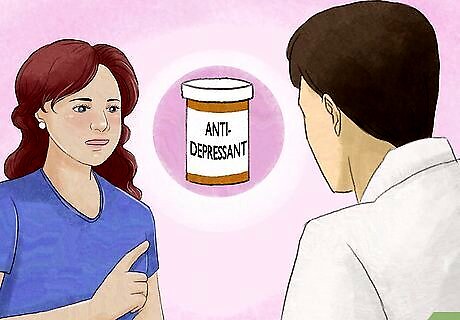
Ask your doctor about antidepressants if you’re depressed. Lovesickness can sometimes be so severe that you become depressed. If you’re depressed, you might feel hopeless, sad, overwhelmed, or irritable. You may also lose interest in activities you used to enjoy. Antidepressants may help you to get through this period of extreme emotion and possibly recover more quickly. Make sure to tell your doctor about any other medications you’re currently taking. Discuss all of the potential side effects of a medication before starting it.
Moving Forward from Lovesickness

Ask out the person you’ve been pining for if possible. If you’re infatuated with someone and you’re both available to date, then ask them out. Keep the request simple and casual. Let them know you’re interested in them and that you’d like to get to know them better. For example, you might say something like, “I really enjoy spending time with you. Would you like to meet up for dinner sometime?” Or, if you don’t know the person well, strike up a conversation with them instead. For example, if you often see the person at a local café, try saying something like, “I’m in the mood to try something new and I can’t decide. What’s your favorite drink here?”

Flirt with or date new people to move past the person. If dating the person is not an option, then find someone new to flirt with or ask them out. Even if the person says no, this is an important part of moving on. Get out, do things with friends, and meet new people! Keep searching for the person who really is right for you. For example, you might strike up a conversation with a classmate or coworker and ask them out on a date. Or, maybe you have a friend who has been begging to set you up with someone. Now might be a good time to let them! If you’re lovesick because of an unhealthy relationship, it might be time to cut your ties with this person so that you can move on. The person you’re with is unlikely to change, so you may end up stuck in the same cycle for a long time.

Note the person’s flaws to help yourself see them more realistically. If you continue to obsess over someone who you cannot date, try to focus on their flaws instead of everything you like about them. Mae a list of everything you dislike about the person and read over it any time you start to think fondly of them. For example, you might dislike an annoying habit of theirs, such as biting their nails or playing with their hair. Or, you might dislike their way of handling conflict.

Rationalize why the relationship didn’t work out. It can be difficult to see why a relationship not working out may have been for the best, but this can be a helpful way to move past it. Consider all the reasons why you and the person may not have made a good match after all and focus on these whenever you find yourself dwelling on the person. For example, perhaps you and this person have very different political views and you would have butted heads constantly if you got together. Or, maybe the person was unavailable due to another relationship and this would have made for lots of drama and pain for the other person involved.

Express gratitude often to experience more positive emotions. Expressing feelings of gratitude can help you to feel happier overall. It may also help to combat some of the negative emotions associated with lovesickness. Try writing out a list of everything you feel grateful for, thank people in person, or write “thank you” notes. You can express gratitude for anything, whether it is something that seems trivial or a huge favor someone did for you. For example, you might be grateful for a good cup of coffee, a ride to work, or a compliment someone paid you.

Get out and spend time with other people. Spending time with family and friends is a great way to distract yourself and build other valuable connections. This may help you to recover from lovesickness. Schedule regular outings with friends and family, such as meeting up for a walk, going for coffee, or even just chatting on the phone. Tip: Make sure to spend time with people you enjoy being around and avoid people who make you feel more stressed or anxious than usual.

Declutter your space if you’re holding on to sentimental items. If you have lots of stuff around that reminds you of the person who you’re pining for or missing, it may be a good idea to get rid of these items or at least put them away so you’re not constantly looking at them. Try selling or donating items, such as clothing, books, and other items that you cannot return to them. Or, if you’re unable to get rid of the items, put them in a box and store it in a closet so they’re out of sight. Try choosing 1 or 2 special items as mementos of the relationship instead of holding on to every single item that reminds you of the person. Make sure that you clear out any online clutter, too. Delete any emails, updates, and photos that intensify your love-sickness.

Set goals for yourself to change your focus. If you’ve been stuck in a rut for a while, having a goal that you can focus on may help you to feel motivated and move past your lovesickness. Think of something you’d like to accomplish and then start working on it. This could be anything that is meaningful to you, such as completing a degree, running a marathon, or learning a language. Identify ways that you can work towards this goal and then start setting smaller goals to accomplish your larger goal. For example, if you want to run a marathon, you might start by completing a couch to 5K training program, and then run a 5K race. If you want to complete a degree, your first goal might be to apply to the college you want to attend.



















Comments
0 comment